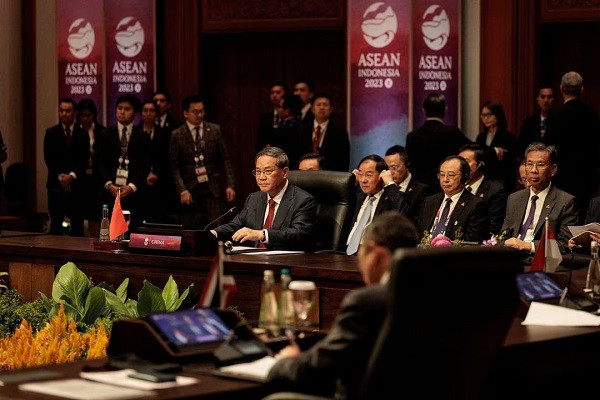Popular Reads
Top Results
Can't find what you're looking for?
View all search resultsPopular Reads
Top Results
Can't find what you're looking for?
View all search resultsASEAN falls silent on South China Sea
Change text size
Gift Premium Articles
to Anyone
A
SEAN chair Indonesia appeared to avoid fresh confrontation with China on Wednesday over its sweeping claims to the disputed South China Sea, choosing to omit a recent point of contention from a regional summit with Beijing.
The second day of the 43rd ASEAN Summit saw leaders of some of the association’s biggest dialogue partners, including China and the United States, attend regional forums to discuss cooperation and existing challenges, spotlighting ongoing political and security concerns.
One long-standing issue for ASEAN, the rivalry between Washington and Beijing, continued to create tensions at the Jakarta summit, where US Vice President Kamala Harris acclaimed the US’ security presence in the Indo-Pacific following China’s release of a new map that has ruffled the feathers of its neighbors.
Chinese Premier Li Qiang, in his first engagement with the group on Wednesday, warned ASEAN leaders against “taking sides” lest they start “a new Cold War”.
China’s official map, which reiterates its claims to areas internationally recognized as belonging to other countries, including some ASEAN member states, India and Russia, has sparked protests and put pressure on the bloc to make its position on the matter clear.
But no explicit mention of the China issue came out of the summit, not even in an ASEAN chairman’s statement touching on the South China Sea and Indo-Pacific tensions.
“We reaffirmed the need to enhance mutual trust and confidence and exercise self-restraint in the conduct of activities that would complicate or escalate disputes,” ASEAN leaders said in a statement issued by Indonesia.
Meanwhile, reports have emerged that the Philippines and Malaysia, two South China Sea claimants affected by China’s new map, have commenced a series of joint maritime exercises that Manila’s top navy official has said seek to demonstrate “preparedness” amid challenges in “dynamic maritime domains”.
Philippine President Ferdinand “Bongbong” Marcos Jr. previously told the media that he would “promote” the map issue during the ASEAN Summit, but one ASEAN diplomat who attended the meetings told The Jakarta Post that no country had actually raised the specific issue.
Indonesia’s chair statement did, nonetheless, reaffirm the 1982 United Nations Convention of the Law of the Sea (UNCLOS) as the “legal framework within which all activities in the oceans and seas must be carried out” and asserted that “its integrity needs to be maintained”.
As a signatory of UNCLOS, Beijing is legally bound to follow it, even as it continues to violate the agreement with its sweeping claims over the South China Sea. Malaysia, the Philippines, Brunei and Vietnam have claims overlapping with China’s.
Aspirational deadline
Distrust of China has simmered for more than two decades since Beijing agreed to draft a Code of Conduct on the South China Sea (COC) with ASEAN as a stopgap solution for the overlapping claims to the busy maritime trade route.
The COC, envisioned as a rulebook for countries to navigate in the disputed waters, continues to elude ASEAN.
Opening the 26th ASEAN-China Summit, President Joko “Jokowi” Widodo said mutually beneficial cooperation could only take place with trust, which had to be built and maintained by all parties.
An official transcript of Jokowi’s speech included a sentence emphasizing “respect for international law” as one of the ways to elevate trust, but the President omitted this part in his delivery.
Meanwhile, the summit suggests both sides are seeking to expedite the COC negotiations, with Indonesian officials previously saying 2026 had been set as an “aspirational” deadline.
This deadline did not appear in the final chair statement, but a diplomatic source told the Post that it had been decided at an earlier ministerial meeting and was “noted” by ASEAN leaders at the summit.
‘Existential burden’
ASEAN’s tendency to beat around the bush on key geopolitical issues has irked some observers.
“‘Noted’ means they have acknowledged it, but it does not mean they will be putting anything into action,” said Lina Alexandra, head of the international relations department at the Jakarta-based Centre for Strategic and International Studies (CSIS), on Wednesday.
With numerous ASEAN leaders already expressing their disapproval, Indonesia should have taken a harder line on China, Lina and other analysts argued.
“I’m not sure what it takes for Indonesia to take a firmer stance,” Lina continued. “After all, we are a maritime country whose very existence relies on respect for UNCLOS. It is our existential burden.”
As a non-claimant to the South China Sea, and with the backing of various nations, it would have been strategic for Indonesia to make its position clear as ASEAN leader before handing over the leadership to the next chair.
“Indonesia may be still prioritizing prudence when it comes to this issue, but I’m not positive if this strategy will strengthen ASEAN’s bargaining power,” said Ahmad Rizky M. Umar, an international relations expert from the University of Queensland, in a message to the Post.
Others see room for a more conciliatory approach.
“China’s claim is illegal. If we respond as if it was serious, the implications would be just that. Acknowledging but downplaying the claim could be a strategy,” said South China Sea expert I Made Andi Arsana.










